
First Grade Math: How to Help a Struggling Student
Learn more about first grade math concepts and get tips for helping your child master them with confidence.
What Do First Graders Learn in Math?
It’s always hard to see a child struggle in school, but fortunately there are many ways for parents to help. A good place to start is by learning what’s expected of first grade math students. Here’s a quick overview of some of the key skills students work on at this age. Get more details about each of these concepts here.
- Place Value: Two-digit numbers are made up of tens and ones
- Addition and Subtraction: Add and subtract two or more numbers within 20
- Shapes: Identify and draw or build basic 2D and 3D shapes
- Telling Time: To the hour and half hour using an analog clock
- Parts of a Whole: Divide a shape into smaller parts that add up to a whole

How to Help Kids with First Grade Math
Once you’ve determined which first grade math concepts are especially challenging for your student, you’re ready to provide a little extra help. These strategies can make a real difference for kids.
Encourage Math Positivity
Math anxiety is a very real thing: approximately 93% of Americans say they feel some degree of anxiety about math. Even if math isn’t your own personal favorite subject, it’s important to encourage a positive attitude toward math in your child. In fact, studies show that kids who have a better attitude about math perform better when solving equations.

So when your child complains about math, avoid saying things like, “I never liked math myself,” or “I agree, math is no fun.” Instead, encourage a better attitude toward the subject by making math practice fun whenever possible. Acknowledge their struggles, but don’t turn math into the enemy.
Help them develop a a growth mindset when it comes to math. Turn “I can’t do this” into “I can’t do this yet.” Remind them that it’s always okay to ask for help, and that the same strategies don’t work for everyone. While math may never be your child’s favorite subject, it doesn’t need to be something they fear or avoid.
Build Math Vocabulary
At this young age, kids are still developing an understanding of concepts like “more and less” and “equal to.” Using math terms frequently in everyday life will help your child become more comfortable with these concepts.
When you’re at dinner, compare the amount of liquid in everyone’s cups, or how much food is left on their plates. Ask your child who has more and who has less, or if any of the amounts seem equal. Use words like “quantity,” as in “What quantity of grapes do you have?”
Find a list of first grade math words here, and make an effort to work them in whenever possible.
Explore Real-Life Math
The terrific thing about first grade math is that it’s very basic and has lots of real-world applications. Look for opportunities to point out math whenever you’re using it. When you’re out shopping, show them the prices, and ask them which costs more and which costs less. If you need eight paperclips but only have three, let them figure out how many more you need.
Telling time is one of the most important real-world math skills kids encounter at this age. Give them every opportunity to read analog clocks and tell you the time to the hour or half hour. Make out daily schedules: “Bedtime is at 8:00. Lunch is at 12:30. You get an hour of screen time at 4:00.” Then you and your child can look at the clock together at a specified time.
Give your child time-telling practice with these free printable worksheets that focus on reading clocks and understanding how to tell time.
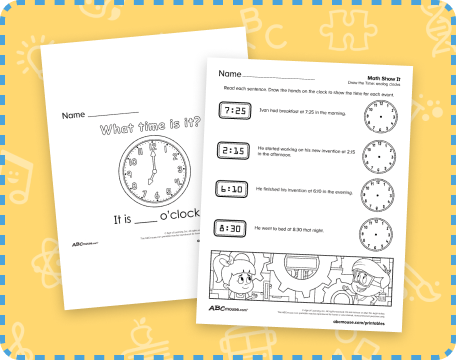
Cook Up Kitchen Math
Mealtimes are one of the best times to bring math to life. Let kids help gather and count ingredients, measure and compare, watch the timer, and more. When it’s time to eat, they can determine how many more plates or chairs are needed, divide food into equal portions, or identify all the shapes they see on the table.
Use Math Manipulatives
Hands on math tools and toys are especially meaningful at younger ages. Handling manipulatives engages additional senses and different parts of the brain. This can help kids learn more quickly, and ensure the learning sticks. are some helpful tools and math manipulatives for first graders:
- 10 Frames
- Hundreds Charts
- Two-Color Chips
- Pattern Blocks
- Base 10 Blocks
- Number Magnets or Beads
- Toy Clock
- Math Balance Scale
You don’t necessarily need to buy special tools for teaching first grade math, though. In fact, you likely have some useful items around the house already. They might include:
- Money (Coins and Bills)
- Dominoes
- Playing Cards
- Dice (Regular and Polyhedral)
- Measuring Cups
- Small Toys (cars, buttons, beads, anything you have a lot of)
Introduce new manipulatives by letting kids just play around with them first. They’ll likely learn new things just by exploring! Then, use the tools together to reinforce various first grade math concepts.
Try Hands-On Activities
Those manipulatives will come in handy for hands-on math practice. The great benefit of hands-on activities is that it gets kids physically involved, which increases both their engagement and understanding.
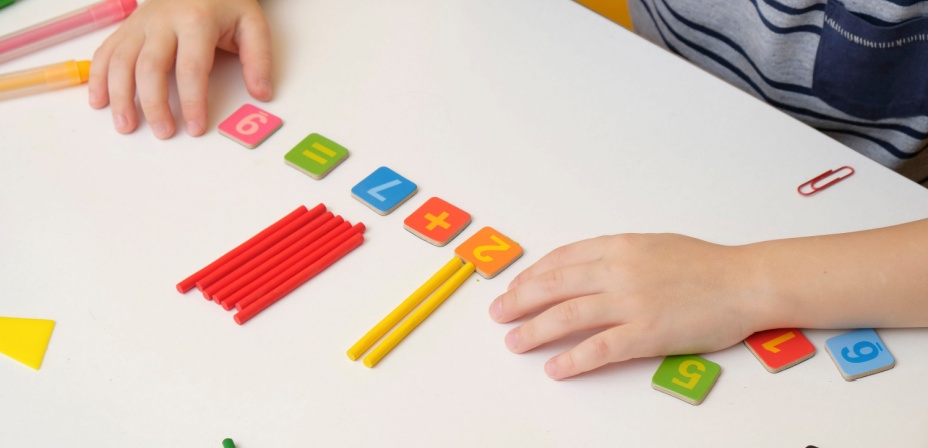
These types of activities are especially helpful for those who seem uninterested in math in general. Giving kids a chance to get up and move, involving more of their senses, makes math practice more engaging. When kids are more willing to practice, they’ll learn more easily and thoroughly. Check out our great list of hands-on first grade math activities to try here.
Play Math Games
Speaking of having fun, make sure to play plenty of math games! Popular board games often involve lots of basic math, so why not start a family game night to sneak in some math practice?
You’ll also find lots of terrific online math games available, allowing you to make screen time truly valuable for your child. ABCmouse has a big collection of first grade math games. Check out some of our favorites and the skills they teach:
Children can play a carnival game that also let’s them practice addition and subtraction facts within 20.
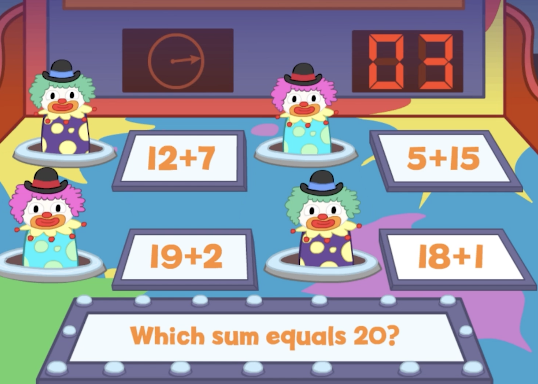
This game aims to help children grow their understanding of parts of a whole as they help slice bake sale treats into halves or quarters to feed the crowd.

Children can practice regrouping and place value (tens and ones) with marshmallows, graham crackers, and chocolate in this interactive math game.
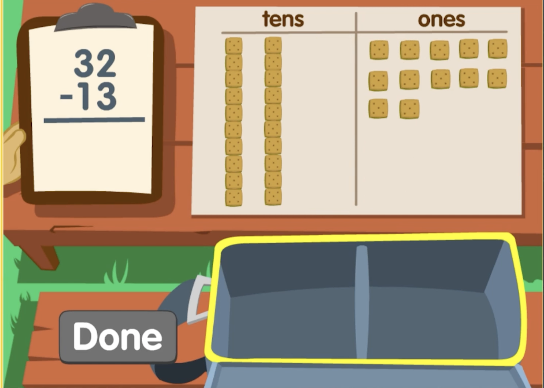
Give children an engaging way to grow their time telling skills with this game that challenges them to set an alarm for various events throughout the day.

This game encourages children to discover different 2D shapes, such as squares, triangles, and rectangles, and learn how to arrange them to form cubes, pyramids, and more complex 3D shapes.

Read Math Books
If your child prefers reading to math, use that to your advantage! There are so many engaging books about math concepts for kids, like these popular picks:
- One Hundred Hungry Ants by Eleanor J Pinczes
- What’s New at the Zoo? by Suzanne Slade
- Game Time! by Stuart J. Murphy
- Lemonade in Winter by Emily Jenkins
- Zero the Hero by Joan Holub
Pair these books with matching activities to enhance the learning. For instance, read Game Time, then work on the Telling Time Worksheets linked above.
Move at a Comfortable Pace
A good math education program allows kids to learn at their own pace, focusing on the skills that need the most work. ABCmouse’s programs meet the needs of all students, in and out of the classroom. Our evidence-based curriculum features progressive online activities, games, and songs, paired with offline printables, workbooks, and more. Learn all about our 1st grade math learning program here.
Online Learning Tools
You don’t need specialized software to teach …., but using a tool like ABCmouse can make it a lot easier! Our app offers interactive and visually stimulating content that reinforces word recognition and reading skills through games and engaging activities.
Check Out ABCmouse ➜
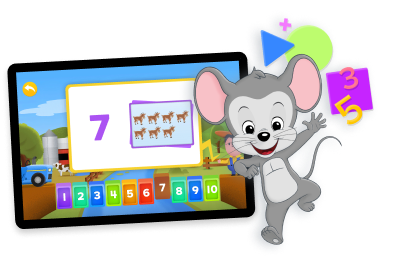
Additional Resources
Free Printable 3D Shape Worksheets
Through a variety of activities including matching shapes, coloring, tracing, and identifying 3D shapes in different settings, children can work on their ability to identify these shapes as well as their written names.
Browse ➜
Color by Number Worksheets for First Grade
While first graders are well on their way to recognizing numbers, these color-by-number worksheets can be a fun way to review numbers.
Browse ➜
Preparing Your Child for First Grade
This resource includes helpful tips for parents to get their child ready for first grade.
Browse ➜
ABCmouse’s expert advice review process:
Our team of ABCmouse Curriculum Experts, made up of talented professionals in early childhood education and development, take a close look at educational content and learning claims. They put in the effort to make sure our information is accurate and current. We have a certified educator or another respected authority review the content, matching their expertise with the topic at hand. They’ll make sure the content is thorough and follows the latest research and educational guidelines. If they think we can make things even better, they’ll chat with our editorial team, and we’ll make those improvements right away. Only after a reviewer gives their thumbs-up does a piece of content get the official stamp of approval in the byline.
Legal Disclaimer: Any information, materials, or links to third-party resources are provided for informational purposes only. We are not affiliated with and do not sponsor/endorse these third parties and bear no responsibility for the accuracy of content on any external site.

